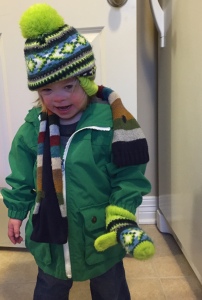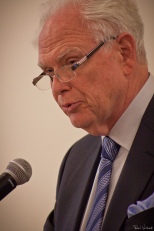Hello!
 As a newcomer to this blog, let me introduce some of the basics about myself: My name is Alan Gard. My son Alijah who just turned 3 has Down syndrome. I’m preparing for my third Hundred Hole Hike to raise money for a Ds related cause, and I am now focused on raising money for LuMind RDS.
As a newcomer to this blog, let me introduce some of the basics about myself: My name is Alan Gard. My son Alijah who just turned 3 has Down syndrome. I’m preparing for my third Hundred Hole Hike to raise money for a Ds related cause, and I am now focused on raising money for LuMind RDS.
Last year, my theme was Iridescent, and you can read more about what I mean by that at http://hundredholehike.com/blogs/iridescent. That piece focuses on some of my early emotions after Alijah was born. While, I have let go of the negative among those as I stated there, I am inspired in a different way this year. Certain lyrics of the Dixie Chicks’ song “Not Ready To Make Nice” particularly resonate with me:
“I’m not ready to make nice
I’m not ready to back down
I’m still mad as hell, and I don’t have time
To go ’round and ’round and ’round”
There are several things about which I’m Not Ready to Make Nice as it relates to things that come along with a Down syndrome diagnosis. One item at the top of that list is the increased risk of Alzheimer’s disease for those with Down syndrome. I’ve seen estimates that Alzheimer’s disease affects 30% of people with Down syndrome in their 50s, and by their 60s almost 50% of people with Down syndrome have Alzheimer’s disease. Statistics like this drive a great sense of urgency, particularly when one considers the higher risk Alijah has of early-onset Alzheimer’s disease.
But my sense of urgency will do little to help Alijah in this regard. Luckily, there is an organization like LuMind RDS with a mission to stimulate biomedical research that will accelerate the development of treatments to significantly improve cognition, including memory, learning and speech, for individuals with Down syndrome with a particular focus on the avoidance of early onset of Alzheimer’s Disease.
This is where I deviate from my theme song’s lyrics. I am going to make time to go ’round and ’round and ’round–the golf course that is–by doing the Hundred Hole Hike (HHH). HHH is a national-network of golf marathons where participants walk 100 or more holes of golf in one day in order to raise money for various worthwhile charitable causes. LuMind RDS certainly qualifies.
Please consider supporting me in my Hundred Hole Hike with a donation to LuMind RDS. Or even better, plan to make your own Hike at a course near you to raise money for this cause.
As a final thought, one of the later lyrics in the song is this: “It turned my whole world around
And I kinda like it,” which is also very appropriate. Like the birth of any child, Alijah has turned our whole world around, but we more than kinda like it. We LOVE it!
Thank you for your consideration!
 We know you love Dr. Harpold and all the LuMind RDS-funded researchers who let you know about the advances in cognition research, but there’s a big world of discoveries out there.
We know you love Dr. Harpold and all the LuMind RDS-funded researchers who let you know about the advances in cognition research, but there’s a big world of discoveries out there.





 As a newcomer to this blog, let me introduce some of the basics about myself: My name is Alan Gard. My son Alijah who just turned 3 has Down syndrome. I’m preparing for my third Hundred Hole Hike to raise money for a Ds related cause, and I am now focused on raising money for LuMind RDS.
As a newcomer to this blog, let me introduce some of the basics about myself: My name is Alan Gard. My son Alijah who just turned 3 has Down syndrome. I’m preparing for my third Hundred Hole Hike to raise money for a Ds related cause, and I am now focused on raising money for LuMind RDS.